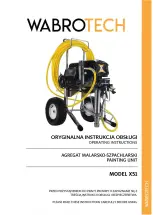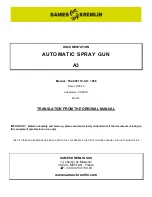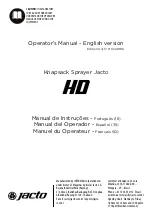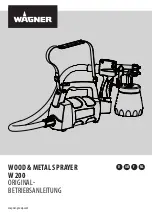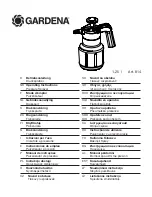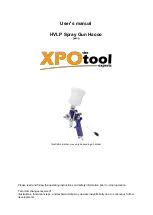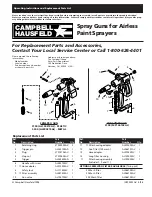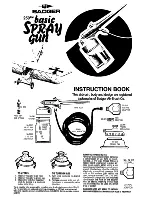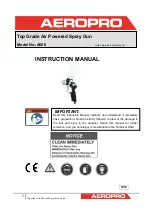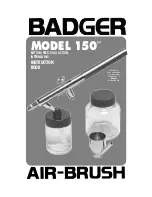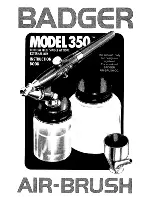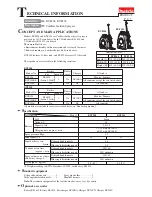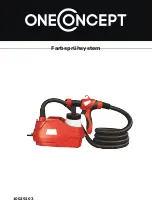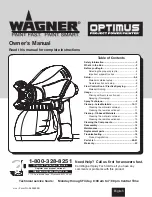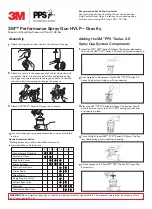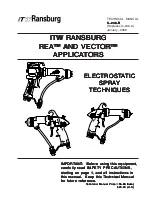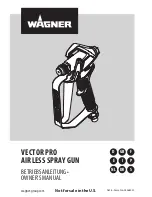
2
© Titan Tool Inc. All rights reserved.
using the Gun Trigger Lock
Always engage the gun’s trigger lock when the gun is not in use.
1. To lock the trigger, rotate the trigger lock forward until it stops.
2. To unlock the trigger, rotate the trigger lock backward until it is
vertical.
Trigger locked
(gun will not spray)
Trigger unlocked
(gun will spray)
Setup
Never attempt to assemble, change, or clean the gun, tip,
or tip guard without first relieving pressure from the spray
system. Follow the “Pressure Relief Procedure” in the
sprayer’s Owner’s Manual.
Always use a tip safety guard for added protection against
injection. Beware that the guard alone will not prevent
injection. Never cut off tip guard! Always engage gun trigger
lock when the gun is not in use. Before servicing equipment,
consult Owner’s Manuals and follow all warnings.
1. Set up the sprayer. Refer to the instructions in the sprayer’s Owner’s
Manual.
2. Attach a conductive or grounded, airless spray hose to the material
inlet on the gun. Using two wrenches (one on the gun and one on the
hose), tighten securely.
3. With the tip and tip guard off the gun, start the sprayer. Flush and
prepare the spray system according to the sprayer’s Owner’s Manual.
Inspect the spray system to make sure that all fittings are secure and
that there are no leaks.
Seal
Tip Guard
Tip Seal
Tip
4. Perform the “Pressure Relief
Procedure” described in the
sprayer’s Owner’s Manual.
5. Using the arrowhead on the tip
handle, insert the tip seal retainer
and tip seal into the back of the tip
guard. Press in for final adjustment.
6. Insert the tip into the slot on the tip
guard.
7. Thread the tip guard onto the gun.
Position the tip guard in the desired
spraying position, then tighten
securely.
NOTE: The arrow on the tip handle should be pointing in the
forward direction for spraying.
Operation
1. Make sure the arrow on the tip handle is pointing in the forward
direction for spraying.
2. Start the sprayer. Refer to the instructions in the sprayer’s Owner’s
Manual.
3. Adjust the fluid pressure on the sprayer until the spray is completely
atomized. Always spray at the lowest pressure necessary to get the
desired results.
NOTE: The spray tip determines the size of spray pattern and
coverage. When more coverage is needed, use a larger tip
instead of increasing fluid pressure.
4. To clear a clogged tip:
a. Rotate the tip 180º so that the arrow on the tip handle is pointing
opposite the spray direction.
b. Trigger the gun once into a waste bucket so that the pressure can
blow the clog out.
IMPORTANT: Never pull the trigger more than once at time with the tip
in the reverse position.
c. Continue this procedure until the tip is clear of the clog.
changing a Tip
Tips can be removed and replaced easily without disassembling the gun.
Never attempt to change or clean the tip or tip guard without
first performing the “Pressure Relief Procedure.”
1. Perform the “Pressure Relief Procedure” described in the sprayer’s
Owner’s Manual.
2. Remove the tip from the slot on the tip guard.
3. Insert the new tip into the slot on the tip guard. The arrow on the tip
handle should be pointing in the forward direction for spraying.
Removing the Tip Seal and Tip Seal Retainer
1. Remove the tip from the tip guard.
2. Insert the arrowhead of the tip handle through the front of the tip
guard.
3. Push the tip seal and tip seal retainer out through the back of the tip
guard.
Tip Guard
Tip
Tip Seal Retainer
Tip Seal
Identifying Tip Sizes
To identify tip sizes, use the following formula. A “1708” tip size will be used in
this example.
The last two digits divided by two represent the size of the spray pattern when
spraying 6” away from the work surface:
08 ÷ 2 = 4” spray pattern
The first two digits represent the diameter of the orifice on the tip:
17 = .017” orifice
NOTE: Worn spray tips will adversely affect the spray pattern
and result in reduced production, poor finish, and wasted
material. Replace worn tips immediately.
cleanup
Maintaining a clean gun is important to ensure trouble-free operation. Flush
the gun after each use and store in a dry location. Do not leave the gun or any
of its parts in water or solvents.
Special cleanup instructions for use with flammable solvents:
• Always flush spray gun preferably outside and at least one hose
length from spray pump.
• If collecting flushed solvents in a one gallon metal container,
place it into an empty five gallon container, then flush solvents.
• Area must be free of flammable vapors.
• Follow all cleanup instructions.
IMPORTANT: The sprayer, hose, and gun should be cleaned thoroughly
after daily use. Failure to do so permits material to cake, seriously
affecting the performance of the unit.
Always spray at minimum pressure with
the tip and tip guard removed when
using mineral spirits or any other solvent
to clean the sprayer, hose, or gun. Static
electricity buildup may result in a fire or
explosion in the presence of flammable
vapors. Hold the gun firmly against a
metal container while flushing.





